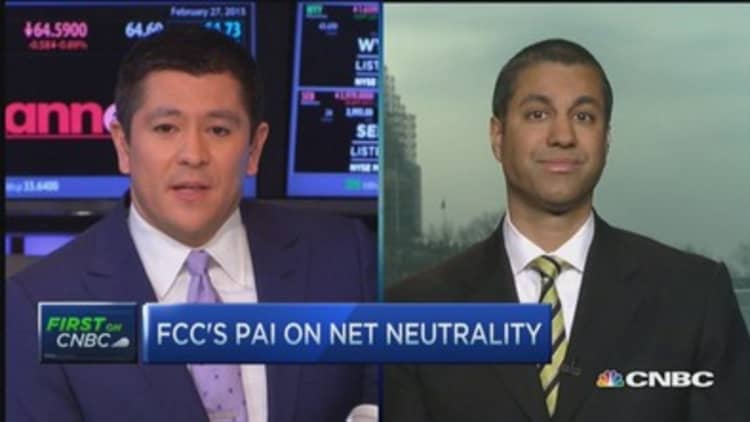
The ruling issued by the Federal Communications Commission will not benefit U.S. consumers but rather will hurt them, one FCC commissioner said.
"In the short term, it is going to mean broadband bills go up [and] broadband speeds go down. Ultimately, it's going to mean that there's less competition, not more," Ajit Pai told CNBC's "Squawk on the Street" on Friday.
The FCC voted 3-2 in favor of implementing President Barack Obama's plan to regulate Internet service providers, or ISPs, under Title II of the 1934 Communications Act. Pai was one of the two FCC commissioners who voted against the measure.
Pai added that the new ruling will hinder competition between ISPs. "The FCC explicitly opens the door to billions of dollars in new fees and taxes on broadband by subjecting them for the first time to the telephone-style taxes under the Universal Service Fund. Moreover, the FCC completely brushes away the concerns of smaller competitors who are now going to be subject to all kinds of taxes [such as] state property taxes, general receipts taxes and the like," he said.
Read More FCC votes to classify Internet as a public utility
The plan, Pai said, does nothing to create more competition within the market. "I want to have multiple competitors in all of these markets and you're not going to have that if we first squeeze out some of the smaller competitors and then on the larger ones micromanage how they interconnect with edge providers, what kind of service plans they're going to be allowed to offer," he added.
Pai also said he voted against the measure because there is no evidence the Internet is need of regulation. "[The FCC] cited the case of an unknown North Carolina ISP a decade ago. They cite Comcast and BitTorrent from eight years ago. If this was a problem of a broken Internet, one would expect to see examples all over the place, but you don't see that. The reason [for that] is the Internet has thrived free from government regulation."


